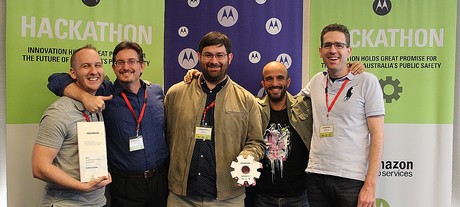Top End solution wins hackathon

Radical Systems has won the 2017 Motorola Solutions New South Wales public safety hackathon.
The Darwin-based business systems developer won the fast-paced, 48-hour challenge with a solution designed to capture vital data for emergency services while maintaining the integrity of highly secure and covert communications.
The solution is designed to provide better connectivity and communications for public safety organisations, enabling improved decision-making and response to major events such as bushfires. The application would also enable system users to capture vital data on their devices when they are not connected to the network.
Radical Systems incorporated the use of Motorola Solutions’ convergence suite of software in its solution design, enabling radio network access to be securely extended to users of smartphones and other devices.
The company was awarded $30,000 in prizes through the competition, including $15,000 in cash and credits with Amazon Web Services (AWS) to further develop its solution in the cloud. Second place went to a combined team from Mastercom and Battlerz, which was awarded a combined $10,000 in cash and AWS credits.
Other competing developers included DiUS, Motorola Solutions, Gridstone and a team of NSW university students studying engineering.
The hackathon was supported by public safety agencies including the NSW Telco Authority, NSW State Emergency Service and NSW Rural Fire Service. Agencies provided challenge statements based on real operational problems faced by their frontline personnel every day.
Real-world solutions
Applying the principles of agile development, application developers worked to resolve the challenge statements by developing smart applications in a pressure-cooker environment.
The event highlighted how mobile broadband innovation could be applied to improve situational awareness and collaboration for Australia’s public safety organisations while opening up new possibilities for developers.
“This experience taught us a lot about what emergency services personnel face in their daily work,” said Iain Buchanan, senior developer with Radical Systems.
“This really stretched our thinking in terms of solutions design and forced us to consider how technology could be applied to improve safety and productivity within their environments.”
“This win will stimulate further growth for business and we plan to expand our solution — possibly by incorporating video streaming and image sharing — to create an even more valuable product for our customers,” explained Adam Whitehead, Radical Systems’ technology director.

Stiff competition
The team that came second comprised just two individuals who first met on the day of the hackathon. Amit Chawathe from Battlerz and Cameron Duff from Mastercom teamed up to compete against larger and more senior development teams and companies.
“The challenge we worked on was regarding the crew welfare of emergency services personnel on the ground during an incident,” said Chawathe. “We developed a prototype for crew welfare and showed how it could be enhanced to engage the public for disasters with a personalised plan for risk reduction. The personalised data could then be leveraged during the disaster for better planning and real-time updates from the public.
“The emergency services representatives at the hackathon were especially thrilled about the latter,” he added. “The solution was also shown to be useful for enabling spontaneous volunteering from members of the public during an emergency. We received great feedback and hope to realise the solution.”
“We cherished the opportunity to work on real-world problems directly with the emergency services and Motorola Solutions staff, by gaining an understanding of the problems on the ground and then proposing realistic solutions,” said Duff. “We were particularly grateful to the emergency services staff and volunteers who gave us their time.
“We came a close second and are proud of the effort and achievement of our tiny team against stiff competition, in a very supportive and well organised environment,” he added.
“We’re grateful to Motorola Solutions, AWS and the government agencies involved for giving us the opportunity to participate,” said Chawathe. “We look forward to the next challenge and the chance to work together again in the future, which is the real win.”

Collaboration
All intellectual property developed during the hackathon belongs to the competing developers, giving them the flexibility to complete their applications either on their own or with support from Motorola Solutions.
Motorola Solutions’ vice president of cloud infrastructure, Tom Guthrie, said his company would continue to invest in hackathons and the growing number of services available within the cloud to deliver innovation to emergency services and enterprise organisations.
“Hackathons and the rapidly growing, common toolsets available within the cloud make a powerful combination,” Guthrie said.
“Used together, they provide a new way for us to work, share our ideas, iterate and learn from each other. This kind of collaboration is essential to developing much-needed technologies to support public safety and enterprise organisations into the future.”
Planning for Motorola Solutions’ next hackathon, in Melbourne in mid-2018, is now underway. For more information, contact Motorola Solutions Australia and New Zealand’s marketing director, Kym Little, at kym.little@motorolasolutions.com.
RFUANZ report: setting the frequency for success in 2025
Last year brought a lot of internal change for RFUANZ, but the association has hit the ground...
ARCIA update: an extended event calendar for 2025
With the addition of Tasmanian events and a conference in Adelaide in September, 2025 will see...
ARCIA update: plans for 2025
ARCIA will be holding a mixture of workshop, conference and networking events in 2025, in the...





